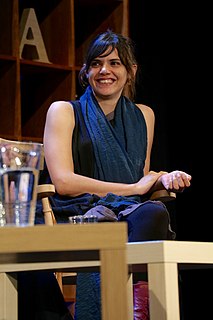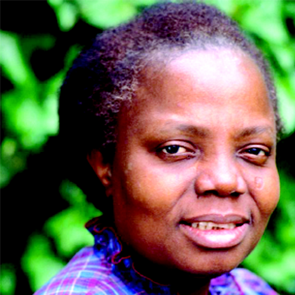A Quote by Valeria Luiselli
I like reading the world through a writer's eyes, rather than seeing a writer looking at him or herself as if at the center of gravity of the world around them.
Related Quotes
It's akin to style, what I'm talking about, but it isn't style alone. It is the writer's particular and unmistakable signature on everything he writes. It is his world and no other. This is one of the things that distinguishes one writer from another. Not talent. There's plenty of that around. But a writer who has some special way of looking at things and who gives artistic expression to that way of looking: that writer may be around for a time.
When you find a writer who really is saying something to you, read everything that writer has written and you will get more education and depth of understanding out of that than reading a scrap here and a scrap there and elsewhere. Then go to people who influenced that writer, or those who were related to him, and your world builds together in an organic way that is really marvelous.
Over time, I have come to see the work of literature less as narrating the world than "seeing the world with words." From the moment he begins to use words like colors in a painting, a writer can begin to see how wondrous and surprising the world is, and he breaks the bones of language to find his own voice. For this he needs paper, a pen, and the optimism of a child looking at the world for the first time.
Handheld camera is approximating what we're seeing when we're looking at each other, and kind of looking around, and your eyes whipping around. It adds an immediacy, where you feel like you are watching something through your own eyes, standing there with them. And that just allows you to take more liberties and have more fun with people's behavior.
When you decide 'to be a writer,' you don't have the faintest idea of what the work is like. When you begin, you write spontaneously out of your limited experience of both the unwritten world and the written world. You're full of naïve exuberance. 'I am a writer!' Rather like the excitement of 'I have a lover!' But working at it nearly every day for fifty years ? whether it is being the writer or being the lover ? turns out to be an extremely taxing job and hardly the pleasantest of human activities.
One of the most useful parts of my education as a writer was the practice of reading a writer straight through - every book the writer published, in chronological order, to see how the writer changed over time, and to see how the writer's idea of his or her project changed over time, and to see all the writer tried and accomplished or failed to accomplish.
To choose a writer for a friend is like palling around with your cardiologist, who might be musing as you talk to him that you are a sinking man. A writer's love for another writer is never quite free of malice. He may enjoy discussing your failures even more than you do. He probably sees you as tragic, like his characters - or unworthy of tragedy, which is worse.
I still have a suspicion of charity and think the state has a role to play in many areas. And although for most of the years since I have been a rather privileged writer, I identify more closely than perhaps I should with those social workers. Had I not become a writer that would have been me. Lots of our friends are still in that world and I do feel part of that generation of people who were rather idealistic in the 70s and became disillusioned in the 80s. Not just about social services issues, but the world.



































